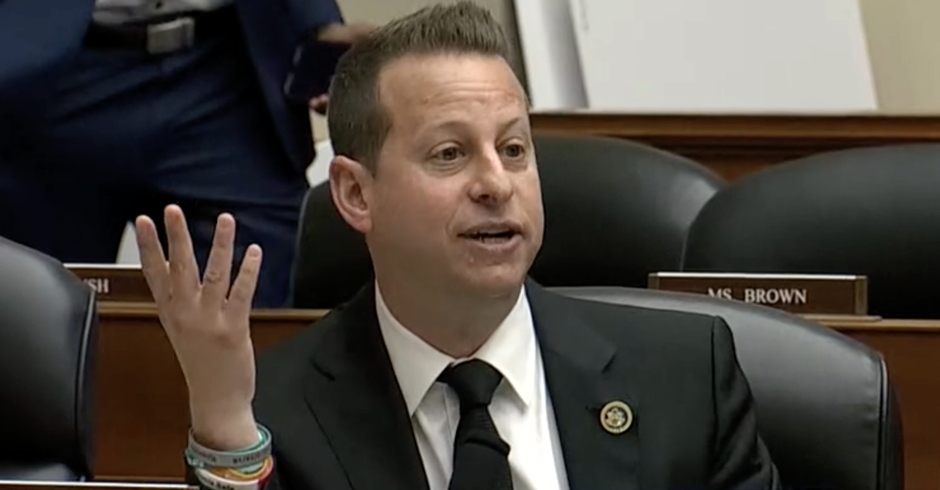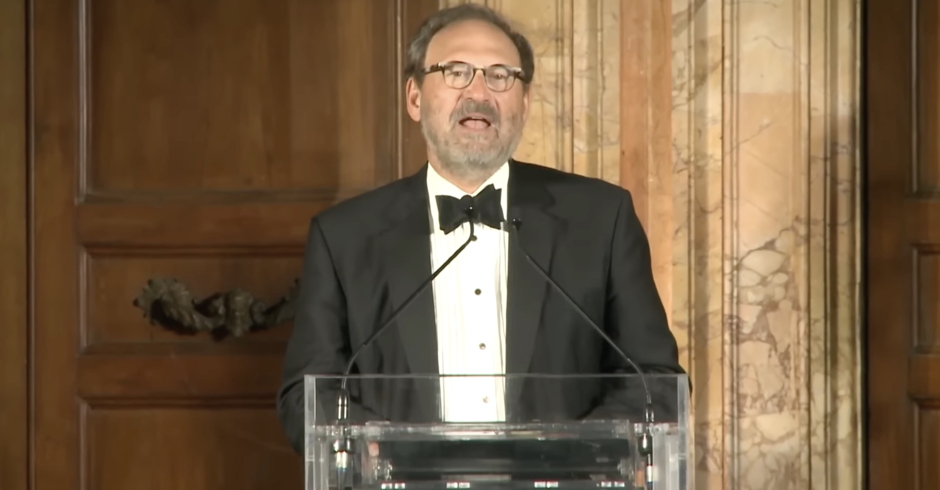Marriage Equality with a Side of Fries
Marriage equality, LGBT immigration, the challenges same-sex married binational couples and their families face — and what marriage really means. Columnist David W. Ross explains.
Yes. I was your atypical waiter/writer/actor in L.A. But I was actually happy to be waiting tables. It meant I could focus on my writing during the day and have the time to do my homework for acting class. Yes, you can actually have homework for acting class. Quinceañera, a film I was in, had won Sundance a few months earlier and I was trying to get used to people gushing over the film (as they should, it was amazing!) and then me having to ask them if they wanted fries or salad with their burger. I was proud of the film, so it wasn’t as painful as it sounds, and I had experienced a similar thing in my early twenties in London when I had opted to work in a juice bar and journalists from my boy band days (the ones that had me on the cover were the most embarrassed) would come in and sheepishly order a carrot and ginger or banana strawberry.
This past week I was listening to NPR’s “To The Point” on KCRW radio. Warren Olney, the host, and his guests were talking about the President’s recent speech on immigration reform. They argued about the DREAM Act, the Hispanic vote and the fact that deportations are up 70% under Obama (specifically, convicted criminals). Not once did they mention LGBT immigration issues. Neither did the President, mind you. Which was obviously a bone of contention for many LGBT immigration advocates.
Shin Inouye, a White House spokesperson, said, “The president delivered this speech because he wants a constructive and civil debate on the need to fix the broken immigration system so that it meets America’s economic and security needs for the 21st century,†and finished off with, “It is fundamental for America to win the future. His remarks are not meant to be a laundry list of all the issues that immigration reform should address.â€
Ouch. Laundry list. That smarted a little. Is LGBT immigration just a bullet point on a laundry list? Tell that to my friend Craig, who’s about to be deported because America (thank you, DOMA,) doesn’t recognize his U.K. marriage so his husband (whose job relocated them to New York) can’t sponsor him with a visa or green card.
Or my friends who have a family, two teenage boys, and face the threat of a knock on the door from ICE at any moment. The stress of raising two teenage boys on a relationship is one thing, but add deportation at any moment and that’s a fine mix of top stressors.
Â
Now, do I want to say one day that I’m married, even if it’s still not legal? Yes. Because the word has gravitas and meaning in our culture. It means, to me, that I’ve made a commitment to someone. That I have created family with someone. That I have promised myself till death do us part. I’m into the more classic wedding vows… But maybe we shouldn’t call it marriage until it’s the same as the other marriage.
Â
Now, I’m not about to rail on the President about this. I understand marriage equality, politically, is a difficult and delicate subject in this country. What I was a little miffed about and have been for several months now, is the lack of media coverage of the LGBT experience. There has been a flurry of mentions, especially when USCIS decided to halt deportations for about 24 hours in March and a little recently when the deportation of Henry Velandia, a Venezuelan who is married to an American, had his deportation put on hold by a judge in a New Jersey immigration court, the day after U.S. Attorney General Eric Holder set aside a ruling in a similar case.
But I’m constantly surprised when media outlets, (especially, for example, Warren Olney’s show this past week on NPR,) fail to mention the LGBT issue, as it relates to immigration. I realize it’s a small part of a larger issue in this country but it would have been nice to hear Warren mention the fact that there are over 30,000 bi-national couples living in this country, with over 40% of them having families. It would have been nice to hear that mentioned along side the DREAM Act and alligators in moats.
But then I have to remember, we’re just a bullet point at this point.
Maybe when we all realize the full extent of the rights missing from same-sex marriage in this country, and the human cost of laws like DOMA. Maybe then we’ll no longer be just a bullet point on Washington’s agenda.
I had a lot of regular customers at the restaurant I worked at. For most of that time I was working on “I DO,” the script I’m about to go into pre-production for (A “gay green card movie,†that highlights immigration rights for bi-national couples). Many regulars would ask me how it was going. I would recount tales of writhing on the floor, chewing my shoes, crying for hours begging my muse to let me in on her secret for what the film should “really†be about. Many times, these smart, well-educated men would joke and say they’d marry me if I needed a green card. I would just smile and say, “I’m good, thank you, but even if I did need a green card you still couldn’t marry me to keep me in the country.â€
They would always look a little perplexed, “What about Massachusetts?†“We could relocate to the East coast but that still wouldn’t do it.†Then I would have to explain that immigration is a federal level right not afforded to same-sex couples. Marriage equality exists only on a state level now, and there are over 1,300 federal level rights missing. Would you like fries or salad with that burger?
It’s been amazing to work on the film and meet so many people who have been fighting for decades on the issue of LGBT immigration. I set up a campaign on Kickstarter to raise money for the film and because of that I’ve heard hundreds of stories of families being ripped apart, by time (months apart waiting for paperwork), space (Americans having to move to a country that has equal rights for same-sex marriage, leaving their birth families here in the U.S.) or Immigration & Customs Enforcement (the constant threat of a knock on the door, or mail with terrible news). Many have emailed me saying, “thank you” for writing a movie that we all hope will raise awareness for the issue. But my issue is that not enough of the LGBT community really knows just how many rights are lacking from lack of legal, state and federally-recognized civil marriage equality.
You hear the word “marriage” and you assume that it covers everything. It doesn’t. Maybe we should call it same-sex unions, or homoriage… (OK, that was terrible). But calling it “marriage” at this stage is confusing to everyone. Not to mention gasoline for the flame that is religion.
Now, do I want to say one day that I’m married, even if it’s still not legal? Yes. Because the word has gravitas and meaning in our culture. It means, to me, that I’ve made a commitment to someone. That I have created family with someone. That I have promised myself till death do us part (I’m into the more classic wedding vows.) But maybe we shouldn’t call it marriage until it’s the same as the other marriage. You know, the straight peoples’ thing. When it has all the rights, rules and privileges that a marriage should provide. Until then the fight isn’t just for the word, it’s not just for white poofy dresses or walking down the aisle in a “hetrocentric†ceremony (my friends always argue about why we should be fighting for a heterosexual institution.) It’s for protection. For family. For basic human rights.
“Two Words Can Change Everything,” is my film’s tag line, but I often wonder if I should change it to “Two Words Should Change Everything.” Being the romantic that I am, I think I prefer the first. But I’m always hopeful for the second.
Â
 David W. Ross is best known for the 2006 Sundance smash Quinceañera and mid-nineties chart topping boy band Bad Boys Inc. After traveling the world, David has made L.A. his home where he has penned his first feature, “I DO,” a character-driven “gay green card” movie highlighting marriage inequality.
David W. Ross is best known for the 2006 Sundance smash Quinceañera and mid-nineties chart topping boy band Bad Boys Inc. After traveling the world, David has made L.A. his home where he has penned his first feature, “I DO,” a character-driven “gay green card” movie highlighting marriage inequality.
Read David W. Ross’s most-recent previous piece at The New Civil Rights Movement, “If You Don’t Help, This Film About Same-Sex Binational Couples Won’t Get Made.”

Enjoy this piece?
… then let us make a small request. The New Civil Rights Movement depends on readers like you to meet our ongoing expenses and continue producing quality progressive journalism. Three Silicon Valley giants consume 70 percent of all online advertising dollars, so we need your help to continue doing what we do.
NCRM is independent. You won’t find mainstream media bias here. From unflinching coverage of religious extremism, to spotlighting efforts to roll back our rights, NCRM continues to speak truth to power. America needs independent voices like NCRM to be sure no one is forgotten.
Every reader contribution, whatever the amount, makes a tremendous difference. Help ensure NCRM remains independent long into the future. Support progressive journalism with a one-time contribution to NCRM, or click here to become a subscriber. Thank you. Click here to donate by check.
 |






















